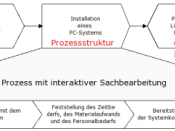"Reengineering and Total Quality Management (TQM) are neither identical nor in conflict; they are complimentary" (Hammer & Champy 239). While Reengineering and Total Quality Management focus on processes, customers and higher efficiency, there are also differences between them. Reengineering moves a company where they need to be very quickly usually by radical change, whereas TQM moves a company in the same direction more slowly, usually with incremental adjustments. Reengineering is a top down, vision driven effort that requires continuous senior management participation and support, while TQM once implemented into a company's processes can work day and day out without much attention from management.
Management trends have grown and died at an increasingly rapid rate throughout the decade of the 1990s. Two that became popular in the late 1980s often have been labeled as failures by organizations that did not fully implement their principles or else did not take enough care in their planning so that it would be possible to fully implement the principles of the underlying philosophies.
The latest twist is that both TQM and Business Process Engineering have value, and that the initiatives can coexist for the improvement of the organization and for enhancing its competitive advantage in its market, a primary directive in today's increasingly competitive business climate. Individuals have often described quality as a philosophy and reengineering as a methodology.
As is the case with most trends, organizations seem to want to chase after one, proclaim it failed before fully implementing it and certainly before allowing it time to become a part of the culture, and then chase off after another. The constant management trend chasing is demoralizing for the employees and costly for the organization in direct costs and the more indirect costs of momentarily sidetracked efficiency and productivity. Too often, there are no appreciable...


